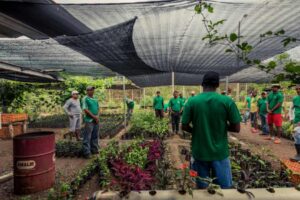
La Joyita prison, just outside Panama City, was notorious for being filthy, overcrowded and dangerous. It was known as the “stomach of the beast” for those confined within its walls. “We literally lived on top of rubbish,” says Franklin Ayón.
“It was everywhere – in the corners, in the corridors,” says Ayón, who was imprisoned for drug trafficking in 2012. “We had to sit with a towel over our head to eat, just so the flies wouldn’t land on the food.”
Ayón, an agronomist by profession, came up with a plan. In 2014, he designed a recycling scheme that he named EcoSólidos: prisoners at La Joyita, one of the country’s largest prisons, would collect, separate, recycle and sell waste. And their work would earn them reduced sentences.
The prison authorities were keen, and the usually warring gang leaders also supported the idea, agreeing a peace deal to allow the project to go ahead.
The project at the prison proved a success. Ten years on, 500 prisoners are now involved, says Eliécer González, head of treatment and rehabilitation in Panama’s prisons.
About 80% of the prison’s waste is now recycled. Plastic and aluminium are sold, while food waste is turned into compost for the prison’s gardens, where fruit and vegetables are grown.
A nursery was created, which donates 1,500 tree seedlings a year to a reforestation scheme run by Panama’s environment ministry.
EcoSólidos opened the way to other opportunities for people in prison to study or work, says González. “This helps us a lot and is a benefit for society,” he says.
The rate of reoffending and returning to prison has dropped from 65% to 45% since 2019. And not one prisoner who has taken part in EcoSólidos has reoffended.
The scheme has been replicated in four other prisons in Panama, González says, and the authorities in Honduras, Paraguay, El Salvador, Peru, Colombia and Nicaragua have shown interest in replicating the scheme.
“This gives us satisfaction,” he says. “We thought we were having a national impact but it turns out that internationally, countries are interested in what we are doing.”
